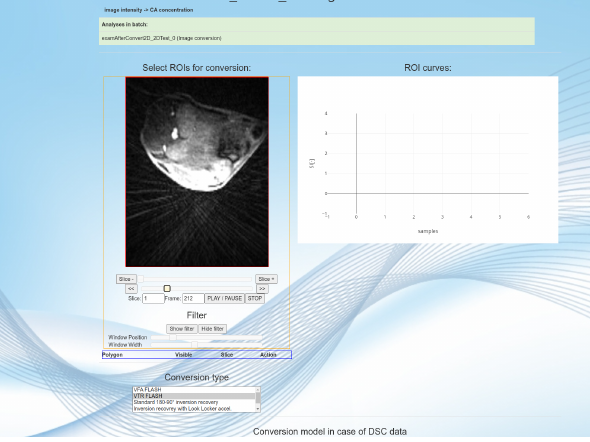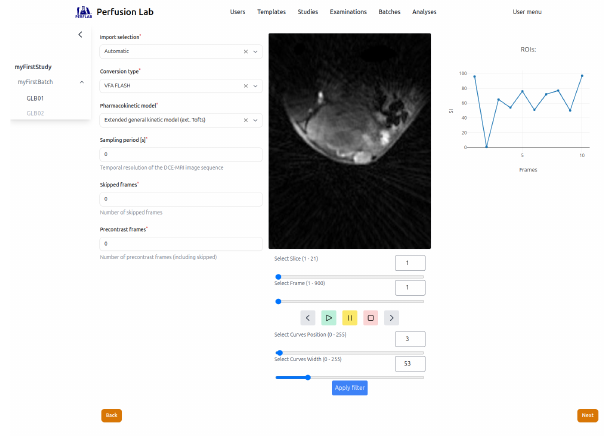Users can now benefit from a new version of PerfLab computational
core.
The new core adds multiple new features, like automatic processing and report creation.
In the backend the core runs on updated Python version and follows stricter coding rules to ensure
better
reproducibility and maintainability. With the release of V4 a
V5_dev is now out for testing and open for feature additons. The V3 is now considered legacy and
will no longer be maintained.
Users can now run all or part of the processing chain automatically
by providing
a link to a reference processing. In steps where user-defined regions of interest are preferred, the
processing
pauses and waits for input.
In cooperation with Medoro s.r.o., we have implemented a secure
connection between
PerfLab and the hospital’s PACS. This allows DCE-MRI data to be sent to PerfLab with a single click
from the MR
system’s console. Once the perfusion map calculation is complete, the results are automatically sent
back to the PACS.
Reference installation: Masaryk Memorial Cancer Institute
Jake Cray presented his pilot study on evaluation of PerfLab’s blind
deconvolution
on his datasets with direct measurements of AIF in the aorta:
CRAY, J L; VITOUŠ, J; JIŘÍK R, TITARENKO S, BUCKLEY D L. Blind Estimation Versus Direct Measurement
of the Arterial
Input Function in DCE-MRI of the Breast. ISMRM Workshop on Perfusion MRI. 2025. Pamplona, Spain
We have thoroughly redesigned PerfLab’s graphical user interface
and restructured
its internal architecture to improve usability and performance.
Online version of a detailed paper on the evaluation methodology and
results
of the OSIPI DCE Challenge finalized as an MRM Paper - published online:
Shalom ES, Kim H, van der Heijden RA, et al. The ISMRM Open Science Initiative for Perfusion Imaging
(OSIPI):
Results from the OSIPI–Dynamic Contrast-Enhanced challenge. Magn Reson Med. 2024; 91: 1803-1821.
doi: 10.1002/mrm.29909
At the end of 2021, we participated in the international OSIPI DCE
challenge
(OSIPI - Open Science Initiative for Perfusion Imaging of the ISMRM Perfusion Study group). The
competition
compared the submitted software tools concerning repeatability, reproducibility, and accuracy of
Ktrans
estimation (focused only on the 1st generation PK model Extended Tofts) on real and simulated cancer
DCE-MRI
datasets (brain tumors). Out of 10 submitted software tools, PerfLab ranked 3rd (results presented
at the
ISMRM 2022 annual meeting in London).

